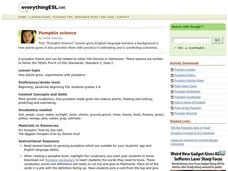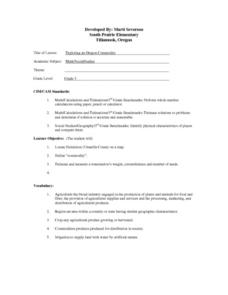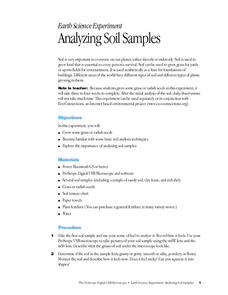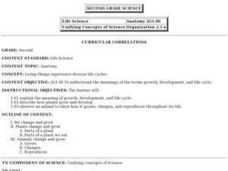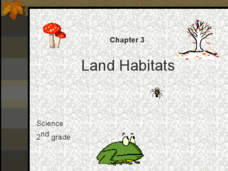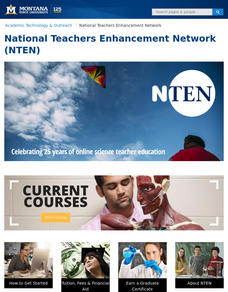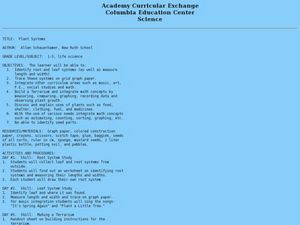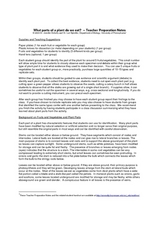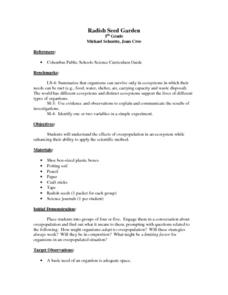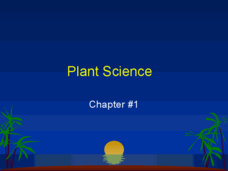Curated OER
Plants -- What Are Their Parts and Functions?
Students identify the parts of a flowering plant and their functions. They describe its life cycle as well. They compare the parts of the plant to the roles that are needed in a democracy.
Curated OER
Pumpkin Science
Here is a nice lesson, which includes some good worksheets, on pumpkins and how they grow. It is an ESL lesson designed for beginning and early intermediate students. After listening to some books about pumpkins, learners label pumpkin...
Curated OER
Germination
Students observe the growth of a seed into a plant. They plant their own seeds and record the growth of the plants and write about what they observe. They describe the germination of the seed and create a time line of the growth process...
Curated OER
Air Pollution
Students seek solutions to environmental problems. They discover how to conserve and protect natural resources. They examine the role of acid rain on plants and discover how to filter pollutants.
Curated OER
Variations in Growth and Reproduction of Recently Transplanted Prairie Forbes and Grasses
students recognize and name prairie plants without the use of a key. they determine that prairie plants have different life cycles that affect their rate of growth and reproduction
Curated OER
Root Caps and the Effect on Gravity Sensing
Students conduct an experiment to determine how the absence of a root cap affects a plant's ability to sense gravity. They make comparisons between capped and decapped roots.
Curated OER
Graphing the Population Explosion of Weeds
Students are introduced to the seed cycle and draw the specific steps. In groups, they identify the human barriers to the spreading of weeds. After calculating the rate of spreading of the Yellowstar Thistle, they create graphs to see a...
Curated OER
Exploring and Oregon Commodity
A fun (and delicious!) lesson teaches measurement to your third graders. They work in small groups to first predict, then to measure the weight, circumference, and number of seeds found in a watermelon. Everyone gets to eat watermelon...
Curated OER
Analyzing Soil Samples
Students grow grass or radish seeds in this experiment, which takes three to four weeks to complete. They become familiar with basic soil analysis techniques, as well as, explore the importance of analyzing soil samples.
Curated OER
Parts of the Plant and Their Functions
Delving into this slideshow will help the students understand the composition of plants and their structures. Each slide identifies certain structures and explores how they support the plant's survival along with assisting our...
Curated OER
Living Things Experience Diverse Life Cycles
Second graders will study and explain the meaning of growth, development, and life cycle. They describe how plants grow and develop and observe an animal to show how it grows, changes, and reproduces throughout its life.
Curated OER
Rename Fruits, Vegetables and Spices
Students explore fruits and vegetables. In this fruits and vegetables lesson plan, students study traits of various fruits, vegetables and seeds. Students rename fruits, vegetables and seeds.
Curated OER
Land Habitats: Grade 3 Science
Build your students scientific vocabulary with this slide show on land habitats. Each slide provides a vocabulary word, image, and definition of a term common to habitats and the environment. Great for science class or as comprehensible...
Curated OER
Should Soil Be Sterile?
Young scholars determine if the sterilization of topsoil is beneficial to seed germination and plant growth. They grow plants alongside control groups, make and record observations of plant growth and measure plant biomass.
Curated OER
Species Interactions
Students research desert species to find where it lives, what it eats, and what species it interacts with directly. Upon completion of research, students construct a web of all the species as a class. This emphasizes the role each...
Curated OER
How to Grow a Sunflower Plant
Students explore botany by conducting a sunflower growth experiment. In this plant life activity, students identify the anatomy of a sunflower plant and the essential nutrients it requires to grow. Students utilize compost, soil, garden...
Curated OER
Plant Systems
Learners examine plant systems. In this life science lesson, students explore leaf and root systems on paper in a terrarium that they design and construct.
Curated OER
Which Parts of a Plant Do We Eat?
Young scholars identify the different parts of a plant. In this biology lesson, students examine its internal parts by dissecting it. They report their findings in class.
Curated OER
Practice with Ions
In this ions worksheet, students answer questions about atoms that have gained or lost electrons, they find the number of electrons atoms tend to gain or lose and they answer questions about bonding in atoms. They answer 6 questions...
Curated OER
An Investigation into Effects of Rhizobium Soil Bacteria on Nitrogen Availability
Students identify the control and the variables in the experiment. They describe the growth of plants with and without nitrogen fixing bacteria, then name the bacterium responsible for making nitrogen available to the plant.
Curated OER
Radish Seed Garden
Fifth graders explore the effects of overpopulation in an ecosystem while applying the scientific method. They discuss overpopulation and its meaning. Students as an organism competes for space in an overpopulated area. They plant...
Curated OER
In Strawberry Fields
Learners discuss the origin of strawberries and employees involved with picking strawberries. In this algebra instructional activity, students discuss how much a worker who picks strawberry makes based on their flats. They create a table...
Curated OER
Plant Science Chapter #1
It may not stand as a cohesive presentation, but individually you may find a use for these slides. One slide describes how civilization began once man learned to plant and harvest food. Another explores the population growth over time....
Curated OER
Structures Of Life
Students investigate the basic conceptual structures of plants, with the focus being the parts that contain seeds. They comprehend that organisms that have fruit for the holding of seeds for replication of the species. The students work...



